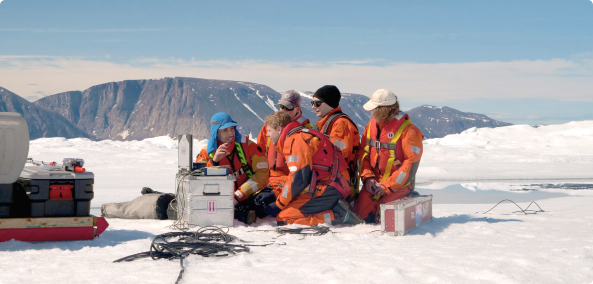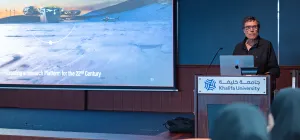Montreal IPY2012 Conference: From knowledge to urgent action?

Three years after the official end of the Fourth International Polar Year (IPY) in 2009, this week will see over two thousand polar researchers, policy-makers, and other interested parties from industry, education, non-government organizations, and circumpolar communities descend on Montreal for the third and final IPY conference. The International Polar Foundation (IPF) will be actively taking part in this gathering through our active participation in two of the highlights of the conference: the PolarEDUCATORS Workshop, and the Public Engagement strand, during which Sandra Vanhove and Isabelle Dufour from the our education team will make a number of presentations, as well as facilitating panels and events.
Building on the two earlier IPY conferences in St Petersburg in 2008, and in Oslo in 2010, which were largely scientific in focus, the Montreal conference aims to draw international attention to the Polar Regions in their global context, including related environmental, social, and economic issues, and should serve as the ‘moment of truth’ that will allow us to question the success of the IPY, both in terms of the production of knowledge, and in terms of public and policy impact. Indeed, with its official “From Knowledge to Action” slogan, and apparent lean toward Arctic research, communities, and policy (an understandable consequence of it taking place in Canada), this conference promises to be rich in the presentation of research findings made possible by extra funding and the spirit of international collaboration that were among the benefits of the IPY. It should, however, rightfully also cast a critical eye on how all this new knowledge has, in the end, penetrated or impacted public opinions and policy.
In its first editorial of 2012, Nature argued “where political leadership on climate change is lacking, scientists must be prepared to stick their heads above water”. Thanks to a constant stream of events large and small, as well as media exposure coordinated, nationally and internationally, through the IPY International Program Office, the polar science community at large has tried hard, during, and beyond the duration of the IPY, to stick its head above the melting ice. The question that persists, however, is whether or not these efforts have been successful; to what extent the polar community can build on them; and whether it is indeed up to scientists to get involved in politics and policy - or whether this should be left in the hands of communication specialist?
The success of TV series such as “Frozen Planet” demonstrate that the Polar Regions continue to fascinate, and (as has always been at the center of the International Polar Foundation’s convictions) can serve as a privileged prism through which to focus public attention on climate change issues. However, messages and findings are often obscured by a lack of basic public knowledge of how Polar environments function, or how they are interconnected and dependent on the rest of the Earth’s systems. This is all the more concerning if one accepts a recent University of Michigan study which concludes that when misinformed people, in particular those who are politically active, “are exposed to corrected facts in news stories, they rarely changed their minds [and] often became even more strongly set in their beliefs”.
So what is the way from here, and where do we stand at the end of this extraordinary communal effort that was the fourth International Polar Year? From the perspective of international collaborative research in the field; the creation of new networks such as the thriving Association of Polar Early Career Scientists (APECS); and indeed, the building of pioneering, solutions driven research infrastructure - the IPF’s zero emission Princess Elisabeth Antarctica research station is but one example, it can already boldly be said that the IPY has been an unmitigated success for the polar community. In the meantime, however, carbon emissions continue to rise, and environmental change in the Arctic and Antarctic has reached a stage on the cusp of the inexorable – with obvious global consequences.
There is indeed a lot to be acted on in the week ahead, and in addressing these issues; perhaps the best outcome for the Montreal IPY Conference would be for it to serve as a beginning (or catalyst), rather than an end.
More from the 2012 Montreal IPY Conference in the coming days.
Jean de Pomereu
Follow us on Twitter, and follow the Montreal conference, using the #IPY2012 tag.
Download





















